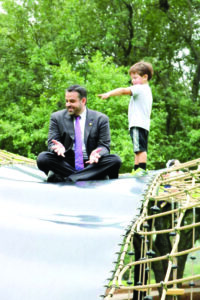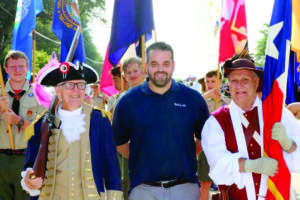By Judy Babb
Dallas District 10 City Council member Adam McGough exudes excitement when he talks about his district, what the residents want and the way people are willing to work toward getting projects done.
He exudes the same excitement when he talks about his three sons and how he takes them with him so they can absorb the importance of serving others.

Photos courtesy of Adam McGough
He keeps his boys involved. His middle son Cooper, now 13, pressed the button to record the vote for the billion-dollar bond package approved by the council. Noah, 14, and Eli, 8, have also attended events and marches and celebrated the opening of new restaurants and developments in District 10 with their dad.
“I love to bring the kids and have them be involved in everything,” he said.
“I’ve been able to watch how this has influenced their lives because they’ve seen it all.”
McGough, a lawyer, is in his fourth and final term as a city council person. His tenure ends in 2023.
From the beginning, he saw his job as being a mediator.
He tells of his early days on the council. He described a very contentious vote on the Trinity Toll Road. It was a tight 8-7 decision.
“I did what I do in normal practice,” he said. “I looked at the interests, identified a solution, and by the end of the meeting, we had the first unanimous vote in history of the city. That became my role.”
McGough’s mediating brought different sides together over Chapter 27 housing issues, police and firemen pension negotiations, raising pay for first responders, and every single budget.
“Every budget since I’ve been involved, we have been able to get key amendments passed,” he said. “The council also has reduced the property tax rates every year. That hasn’t happened in the history of the city as far back as I can go.”

The day-to-day would keep anyone busy but often things quickly change. McGough is head of the Public Safety committee. That meant the Dallas Police Department’s massive data loss fell under his purview. He and District 12 City Council member and Government Performance Committee Chair Cara Mendelsohn banded together to determine what happened, the timelines, the plans to make sure it didn’t happen again.
“We wanted to get the basic things before we opened it up to the rest of the council,” McGough said.
But it got harder. McGough was supposed to speak on a panel, which overlapped most of the council meeting. The panel started 30 minutes before the meeting so McGough frontloaded what he had to say and then tried to keep up with panel and chime in when he could.
“There’s never a dull moment,” he said. “Sleep is a luxury I’m looking forward to one of these days.”
McGough never aspired to be in politics. “I always view myself as a public servant and that is the lens I try to look through on all of this,” McGough said. As each new term approached, he didn’t know if he would run. “I’m very faith guided, and I had to go through the process considering family and other issues.”
He always wanted to make sure he would be effective and be where he was supposed to be. That started when he moved to Dallas from Nacogdoches and worked as a community prosecutor. He settled in and believed he was doing the job well. But his phone rang, and then-Mayor Tom Rawlings asked him to be his chief of staff and run the Grow South Initiative. In 2015, he was elected to city council.
“Each step of the way has been very interesting and not a planned approach,” McGough said. “But it’s put me in a lot of interesting places.”
Among those are planning for Ebola, helping work through the tragic July 7, 2016, shooting of 12 Dallas police officers and, of course, the pandemic.
“The mayor appointed me to chair the community side of the COVID response,” he said. “I was still chairing public safety when all the protests were happening.” He had his hands full. McGough salutes Hamilton Park and Lake Highlands for bringing the community together to support the district initiative, All in D-10.
“We get people together every month just to get ideas,” he said. “I’d say ‘Give me my to-do list.’”
One of those is 12000 Greenville — The City of Refuge Lake Highlands. This program will bring in community assets — a restaurant, a coffee shop, an urban farm, a farmers market and a coworking space for people to develop work skills. It will have a village of tiny homes and staff homes to help people coming out of crisis.
McGough is excited about the model.
“It doesn’t exist anywhere else,” he said. “We see it as a model we will use in other parts of the city and that will be used in other parts of the country.
“We are intentionally creating spaces where people from different walks of life share the same spaces. Everyone grows together and we are a better community for it.”
He is also excited about being able to spend more time with his family. Don’t look for him to run for mayor.
“I don’t know what happens next,” he said. “That goes back to my faith and everything else will work out. I just want to be the best husband and dad for my family.”
